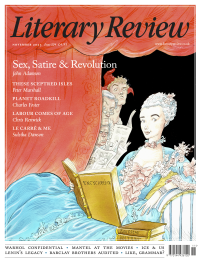Jay Gilbert
Subordinate Claws
Open Throat
By Henry Hoke
Picador 176pp £14.99
The protagonist of Open Throat is in Los Angeles but not of it. It’s a position, the slyly angled narrative suggests, in which many people find themselves. Unlike them, however, our narrator is a mountain lion, a cougar. We don’t necessarily know this during the first tranche of the novel, but that’s okay: our narrator, referred to as ‘they’, doesn’t either. When they hear themselves described through another’s eyes, the revelation is piercing: ‘Oh. Is that what I am?’
At its heart, Open Throat is about mutual observation, the foreignness of others viewed from afar and the horror of coming face to face with another’s skewed perception of oneself. Henry Hoke’s cougar is nameless for most of the story; skulking near the iconic Hollywood sign, the wild cat frequently encounters humans but does not deliberately interact with them. Nevertheless, the cougar draws a distinction between the tent-dwelling homeless (‘my people’) and the fly-by-night TikTokers who curse ‘fucking helicopters’ for interrupting their videos and recoil in terror at the sight of an animal whose home they have invaded. In this cat’s-eye view of the world, ‘LA’ becomes as the cougar hears it: ‘ellay’. When they speak of ‘scare city’, the reader understands that scarcity is the real horror at hand – but, in the end, is the cougar wrong? Hoke’s phonetic spellings and disregard for the customs of capitalisation intensify the novel’s portrait of alienation: we understand what the cougar is seeing, able to discern shapes from these fragments, but then, we are part of this world. The cougar does not enjoy the same status.
The animal’s parasocial relationship with the people they define as worthy is seemingly a replacement for older, now-lost associations, such as that with their mother and with their former ‘kill sharer’. Even other mountain lions, though, have not always been welcoming: the narrator observes that ‘a father to a

Sign Up to our newsletter
Receive free articles, highlights from the archive, news, details of prizes, and much more.@Lit_Review
Follow Literary Review on Twitter
Twitter Feed
Under its longest-serving editor, Graydon Carter, Vanity Fair was that rare thing – a New York society magazine that published serious journalism.
@PeterPeteryork looks at what Carter got right.
Peter York - Deluxe Editions
Peter York: Deluxe Editions - When the Going Was Good: An Editor’s Adventures During the Last Golden Age of Magazines by Graydon Carter
literaryreview.co.uk
Henry James returned to America in 1904 with three objectives: to see his brother William, to deliver a series of lectures on Balzac, and to gather material for a pair of books about modern America.
Peter Rose follows James out west.
Peter Rose - The Restless Analyst
Peter Rose: The Restless Analyst - Henry James Comes Home: Rediscovering America in the Gilded Age by Peter Brooks...
literaryreview.co.uk
Vladimir Putin served his apprenticeship in the KGB toward the end of the Cold War, a period during which Western societies were infiltrated by so-called 'illegals'.
Piers Brendon examines how the culture of Soviet spycraft shaped his thinking.
Piers Brendon - Tinker, Tailor, Sleeper, Troll
Piers Brendon: Tinker, Tailor, Sleeper, Troll - The Illegals: Russia’s Most Audacious Spies and the Plot to Infiltrate the West by Shaun Walker
literaryreview.co.uk